From a reader…. it is clearly peony season!
One of these would be perfect for new priests. … older priests too, come to think of it.
Ah peonies…. in the back yard of one of the many places I lived as a kid there was a long bank of peonies.
Here is a Chinese poem by Tang dynasty poet Bai Juyi (+846) to enjoy while looking at the mug shot.
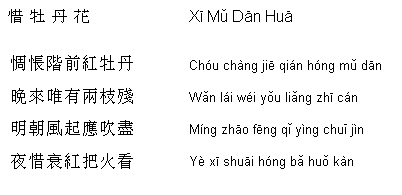
On that note, saying the black and doing the red is at times a bit tricky.
I will show you why with two photos of red and black problems from Holy Mass yesterday.
Yesterday was Ember Day of Pentecost. It was the last day of the Octave of Pentecost (yes, this is the traditional Roman way).
I used the shorter form for the Ember Day and was amused to find a red/black screw up in the book.
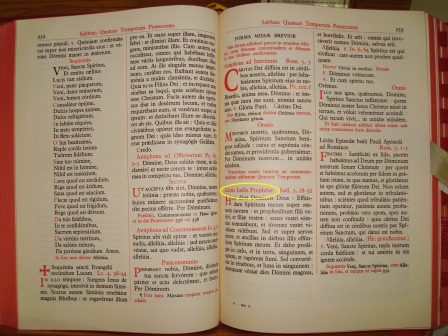
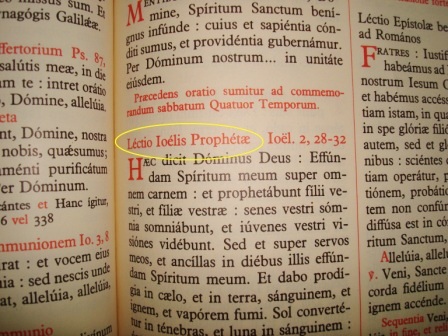
According to this typographical error, the priest would not say the name of the reading, which he ought. And he will if he is paying attention while saying Mass.
The Octave has special Communicants and also Hanc igitur. You can in most editions of the older Missale Romanum turn to a page that has the whole thing as it is should be said without having to switch pages back and forth.
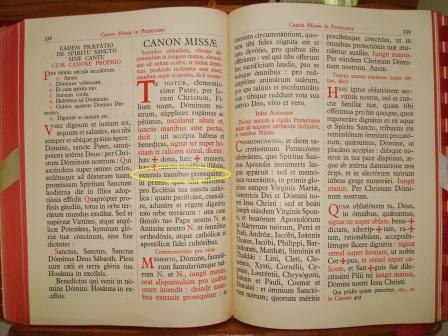
If the priest is not paying attention to what he is saying, he might wind up reading a rubric because of the typo.
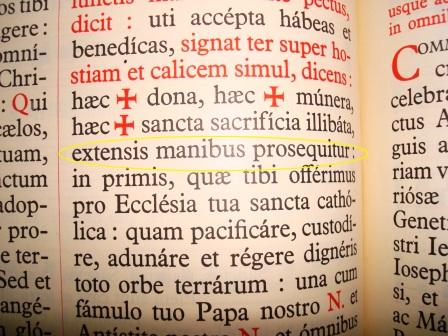
Since the priest is saying the Canon silently at this point no one would know.. right?
Just the priest… and all the choirs of angels.
So… by all means… Say The Black and Do the Red.
The publishers of our books also need to PRINT the Black and PRINT the Red … correctly.
"But Father! But Father!", some of you will be saying. "I can’t stand this! What does that Chinese poem mean? I don’t read Chinese!"
I’m saddened by the peonies before the steps, so red,
As evening came I found that only two remained.
Once morning’s winds have blown, they surely won’t survive,
At night I gaze by lamplight, to cherish the fading red.
The peony in Chinese poetry and art was a favored subject. While peonies often had to do with virginity and red peonies trended to more erotic imagery. But Bai Juyi also used an ancient style for poems with political overtones. Flowers and colors meant things in poems. Usually sad things.
But rubrics and texts make us happy!
So… buy some mugs and give them to priests.



































We have lots of peonies in our yard. The red ones have finished blooming, the white ones are just blooming, and the pink ones will follow soon after!
A priest friend once told me a story about peonies and the feast of Corpus Christi.
On the feast, there were white and red peonies at the altar. During the Eucharistic prayer, at the elevation of our Lord’s body, the white peonies dropped their flowers. At the elevation of His Precious Blood, the red peonies also fell to the ground. :-)
Peonies are all too brief here in MN too. The trick is to plant a variety of different kinds that bloom early, late and somewhere in the middle to extend the bloom time. Then if you get a run of 3 or 4 hot days or exceptionally wet or windy weather your peonies won’t all shoot their fireworks over a few days. And they only bloom once a year!
Here in Central IL, the peonies out by our mailbox bloomed very early. They’d usually be in prime flower right now, but they’re fading fast. The others in our back yard are in flower now.
Here’s a picture of one by the mailbox from two years ago:
http://www.flickr.com/photos/nhaggin/4653609503/
Speaking of typos in the Missal, I’ve heard/read that the following could possibly be scribal errors in the transmission of the Roman Canon:
First:
Infra actionem
Communicántes, et memóriam venerántes…
It is suggested by Denis Crouan that “Infra actionem” used to be the words “in fractionem” in the prayer, rather than a heading, which he says would allow “Communicántes…” to make sense.
Second:
pro quibus tibi offérimus:
vel qui tibi ófferunt hoc sacrifícium laudis,
pro se suísque ómnibus
Enrico Mazzo suggests that the “vel” here was actually a rubric, for the priest to decide between the two phrases, which one he will use. One commentator said that seeing the two phrases as options makes a bit more sense.
Any comments?
When the reprints of the 1962 (actually 1960) Missale, first came out, I guess around 2000, that was the first thing that caught my eye (not the “Lesson of the Prophet Joel”, but the “extends his hands”, and showed it to Fr Marks, who thought it was quite funny. He read it (thankfully not at Mass) as though it was part of the actual reading of the Canon.
All I can think of is Hans Küng gazing by lamplight at what’s left of his revolution in the Church…
I think Peonies are my favorite flower. They have such a rich fragrance, a small taste of heaven. And as they are so brief, a reminder to us of how brief this life is, but at the same time, just a glimpse of the beauty we will find in the kingdom. We have white peonies blooming in my parents yard.
Thank you for the poem Father! I didn’t realize how important the peony is to Chinese culture until I looked into it–it seems it’s one of the two flowers (along with plum blossoms) most central to Chinese culture. In poking about online I found the following somewhat amusing legend online in connection with Luoyang, the long-time eastern capital along with Chang’an (Xi’an) the western one, and the self-proclaimed City of Peonies: “Luoyang is known as the ‘city of peonies,’ and the best time to visit it is in late spring when the peonies are in full bloom. It is said that Empress Wu Zetian (624-705) of the Tang Dynasty once decreed that all the flowers in her royal garden in the capital Chang’an (today’s Xi’an) were to bloom in deep winter. The flowers, afraid of the power of the Empress, all bloomed, except for the peony. This enraged the empress, who ordered the peony degraded and moved to Luoyang. Since then, the plant flourished here.”
I was unclear as to whether and when one could use the shorter version for the ember day. (My latin is weak). Am I to understand that it is the priest’s option to use the short one?
J Kusske!
Here am I, 20+ years working in Chinese, and this story is totally new to me! Indeed, it is not at all out of character for the cruel and imperious Wu Zetian. It always pays to come to WDTPRS, no matter who you are.
Confucius said that whenever he was in the presence of three companions he never lacked for teachers, he would study the virtues f two while avoiding the vices of one. Today I have learned, from you, as I always do from Fr. Z, and as for the third companion, I shall simply look in a mirror, there to find a cornucopia of vices.
I might add that Bai Juyi is my favorite Tang poet, more narrative than Du Fu, more accessible than Li Bai, he was said to have always read his poems to his washerwoman, and not to consider them finished unless someone so completely unlearned could enjoy them. He is simply the most “universal” of the Tang poets. His “PiPaXing” is IMHO is finest work. Truly heart-rending.
Praise God, I was able to do something good in commenting here–I am far less well-versed than most people here, certainly than you are, Timbot! We are all learning together. Most days it is I who am left examining the mirror after seeing the virtues of others. I do hope we can become a kind of new group of disciples, whether it is under a second Master Kong or someone higher yet–whoever he is, Fr. Z is a fair representative!
Timbot: Bai Juyi …was said to have always read his poems to his washerwoman, and not to consider them finished unless someone so completely unlearned could enjoy them.
I love that!
Pipa Song (Pipa Xing)
Bai Juyi
One Autumn night on the Yangtze River side,
I bade farewell to my friends on a boat.
Soft wind rustles reeds and maple leaves,
I, the host, dismounted and the guests went aboard.
Cup in hands, but there was no music,
We drank with depressed heart,
Seeing my friends off while the moonlight bathing in the river.
Suddenly the pipa sounds drifting to our ears from a neighboring boat,
My guests forgot to leave and I knew not where we were.
Tracing the sound, we looked for the wonder maker.
The music stopped and there was no sound to hear.
We moved our boat near the musician’s to invite
Here to drink at our feast replenished by lamplight.
We urged her over and again until she appeared,
With half her face hiding behind the pipa still.
She turned the pegs and tuned each string few times,
Her music flew out even before playing a note.
Each plug on the string gave a note of melancholy,
Pouring out the resentment of her life.
She knitted up her brows and carried on,
Telling from her heart the life story long.
Now playing softly, now playing swiftly,
She performed first “Liuyiao” and then “Nishang”
The bold strings rattled like splatters of sudden rain,
The fine strings hummed like lovers’ whispers.
Chattering and pattering, pattering and chattering,
As pearls, large and small, on a jade plate fall.
The sweet melody recalls oriole singing among flowers,
The sobbing music brings the gushing spring out of glacier,
The spring frozen, the strings ceased vibration.
The water stopped flowing and silence set in.
In my heart, a spell of deep feeling,
At this magical moment, silence tells more than sound.
Suddenly a strain of notes burst out
Like water splattering out of a fallen vase
Or horsemen riding among a forest of spears.
She struck the four strings all at once
As if the silk curtains were ripped with great force.
With her plectrum sweeping over the string,
The music came to an end with a crystal snap.
And tranquil overwhelmed in the boats far and near,
Only the Autumn moon shining in the rever so pale.
Sadly, she put the pick back under the strings
And rose elegantly with her manner respectful,
Saying that she was originated from the capital,
And lived in the famous district of Xiamoling.
By thirteen she had mastered the pipa,
And was first among equals at the Imperial Conservatory,
Her art the admiration even of master Shancai,
Her beauty the envy of all pretty girls.
Suitors competed to reward her,
For every song she received endless bolts of silk.
She sang, she beat time, all through the day,
She danced till her head gear fell to the floor.
Wine spilled, skirts stained,
Delicacies rivaled gaieties.
Day after day, and joy upon joy,
Her best years slipped away.
Then her brother joined the army, and her aunt died.
Times changed, and her beauty faded.
Her patrons wandered off, went elsewhere,
And the carriages at her door got fewer and fewer,
Till finally she had to lower herself marry a tea dealer.
All he thought of was money, parting never bothers him,
So the month before he’d gone to Fuliang, to buy tea,
And she had been left to tend the boat all alone,
No company but the cold water and the moon.
In the deep of night she would dream of the past,
Awake from Crying, her face wet with tears.
I had sighed when I heard the music,
But now, having heard her story, sadness doubled.
“Both of us are strangers here, both of us stranded,
Does it matter that we’ve just met, if our hearts understand?
I left the capital a year ago,
And now, a sick exile at JiuJiang, my sorrow grows.
The city is far away, there is no music,
No flute, no pipa, all the year long.
I live, now near Pencheng, damp and low,
Choked with reeds and bamboo.
What do I hear, day and night?
The sad songs of cuckoos, the sad cries of apes.
On a spring day, at the river,
Or on an autumn moonlit night,
Often-I sit up, alone, and sip wine.
There are folk songs, of course, there are village flutes,
But they are so crude and they grate on my ears.
Tonight I heard you play the pipa.
It brightens me like music from Heaven.
Sit down once more, please play an ancore,
And in turn I will write you a “Pipa Song”.
Moved by my words, she stood there, silent for a long while,
Then she sat down and quickly tuned her strings again,
Grief-filled and heart-felt she played a different tune.
Tear-soaked, sorrow-laden, all sobbed out at once.
And who was weeping the bitterest tears of all?
The Deputy Chief of Jiujiang Prefecture,
whose blue gown was soaked in tears.
Would it be appropriate to maybe underline that defective rubric in red? I think I’d draw the line (ahem) at using a highlighter in a Missal but maybe that’s just me. I once saw in our parish’s old Missale Romanum that the 1962 commeration of St Joseph had been added-in in handwriting, in what was clearly blue biro. The handwriting was beautiful, copperplate but the biro seemed a bit… jarring. Black ink would have been better, I thought.
At the same time, this post makes one appreciate the amount of skilled proofreading that must go into the production of a Missal, particularly a Latin one.
Father, I saw this on a Catholic Blog
The bishop is a brighttp://4.bp.blogspot.com/_LoJ0g4Mxk2Q/S_fFjZxJlDI/AAAAAAAACeI/7WjmgN4LSVA/s1600/IMG_5342.JPGht star of the Catholic new evangilisation
hes holding your cup!
In your translation of the poem, Father, did you mean to write, “White peonies often had to do with virginity and red peonies trended to more erotic imagery.” instead of “While peonies . . .”??
Was this one of those Chinese “deliberate” errors embedded in an artist’s work to remind him of his own fallibility? This post is a work of art, to be sure. We are all richer for having had a glimpse of peony season, both here and in the art of China. Juxtaposed to this posting is another of your exquisitely simple, unaffected but luscious accounts of how to make a meal an act of grace.
God bless you.
Speaking of errors, my reference should have been not to the actual translation of the poem but to Father’s comments on it after giving the translation, explaining the meaning of peonies. Something there is about this medium–it’s immediacy–that creates typos and errors.
And how about “its” for “it’s” in my last posting.
If I keep this one short enough, perhaps I’ll get it right???
Except that my last statement was a comment, not a posting, if one wishes to be precise about it.
jaykay, I don’t think those are real highlighter ‘circles’. They look like they are super-imposed, I could be wrong.
The peonies are beautiful. I have a few pink ones. Can anyone tell me if there is truth to stories that the white peonies with a red petal or two are the most fragrant?
wanda: no, didn’t mean to imply that Fr Z used a highlighter on his actual Missal :) Thoughts were running ahead of me & what I meant was that use of a highlight pen would be inappropriate in such a situation. People use them everywhere now: students using them on library reference books is a big prob in our local library. That poem is hauntingly beautiful, Fr. Thanks.
I’ve had peony bushes growing on the side of my garage since childhood.
They just started to open up a day or so ago.
Is it just a ‘legend’, or is it true that ants help open the flowers?
Ah, so those are the ant flowers! I well remember the ants crawling all over the bush when the buds came to open, and gazing on it with wonder when I was a boy. They must really like the sweet taste of the flowers. Whether they help the buds open up or not, there is certainly a connection between them!